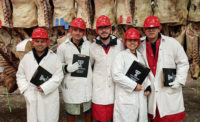There is no better time to be a student at Texas Tech University, especially in the Department of Animal and Food Sciences. Enrollment is rising, research is booming, and student success is at an all-time high. The Meat Science and Muscle Biology Program is within the animal and food sciences department, and its mission is to strive for honor in the pursuit of excellence and enhance the quality of life through innovative teaching, research and public service in meat and food sciences.
With degree options for undergraduates in emphasis areas such as meat science, meat science business, animal business, animal production, pre-veterinary, food safety, food security, and food science, students are sure to find a program that fits their interests and career goals. Additionally, there are advanced degrees available in the areas of animal science, food science and meat science for graduate students, as well as, an animal science doctoral degree. Facilities such as the Gordon W. Davis Meat Laboratory and New Deal Research Farm, coupled with state of the art laboratories, give students the opportunity to experience numerous aspects of the industry first hand. Students also have the option to develop important skills through competitive judging, academic teams and undergraduate research projects.
Additionally, Texas Tech has a strong reputation in the areas of research and development. Once extremely limited, its research program is quickly becoming one of the best in the nation. Although the program is extremely integrated, there are three distinct areas of research. First, Brad Johnson, professor and the Gordon W. Davis Regent’s Chair in Meat & Muscle Biology, focuses on marbling qualities of meat science research. Johnson has worked extensively in researching the growth and development of major tissues, specifically skeletal muscle, and looking at how steroidal implants will impact the overall palatability and quality of a carcass.
Next, Chance Brooks, an associate professor in meat science, focuses on the effects of package type and package characteristics on the shelf life, spoilage masking, and safety of meat products. In addition, Brooks has explored ways of adding value to beef products through product enhancement, manipulation of underutilized enhancement techniques, and use of unconventional muscles for steak and roast cuts.
Also, Mark Miller is a Horn Professor and the San Antonio Stock Show & Rodeo Distinguished Chair in Meat Science. Miller’s research emphasis is in the areas of meat quality and value added technologies, food and meat safety, and food security. Miller’s meat quality research is focused on the global consumer and the impact that fat level, production practices and growth technologies have on meat palatability of tenderness, juiciness and flavor.
|
Fact Box: Texas Tech University, Lubbock, Texas Meat Science and Muscle Biology Program in the Department of Animal and Food Sciences Chair: Michael Orth, Ph.D. |
Two additional members of the research team include Professor Leslie Thompson and the Director of the Center for Food Industry Excellence and Professor of Food Microbiology and Food Safety Mindy Brashears. Not only does this group of faculty focus on research relevant to the United States, but they also have a global research perspective with projects in Australia, New Zealand, Poland, France, Wales, Ireland, Mexico, Honduras, Brazil, Haiti, and Malawi, Africa.
Through research, engaging classes, hands on learning, top-of-the-line professors, and international opportunities, the goal of this program is to ensure that every student leaves Texas Tech University ready for the future.







